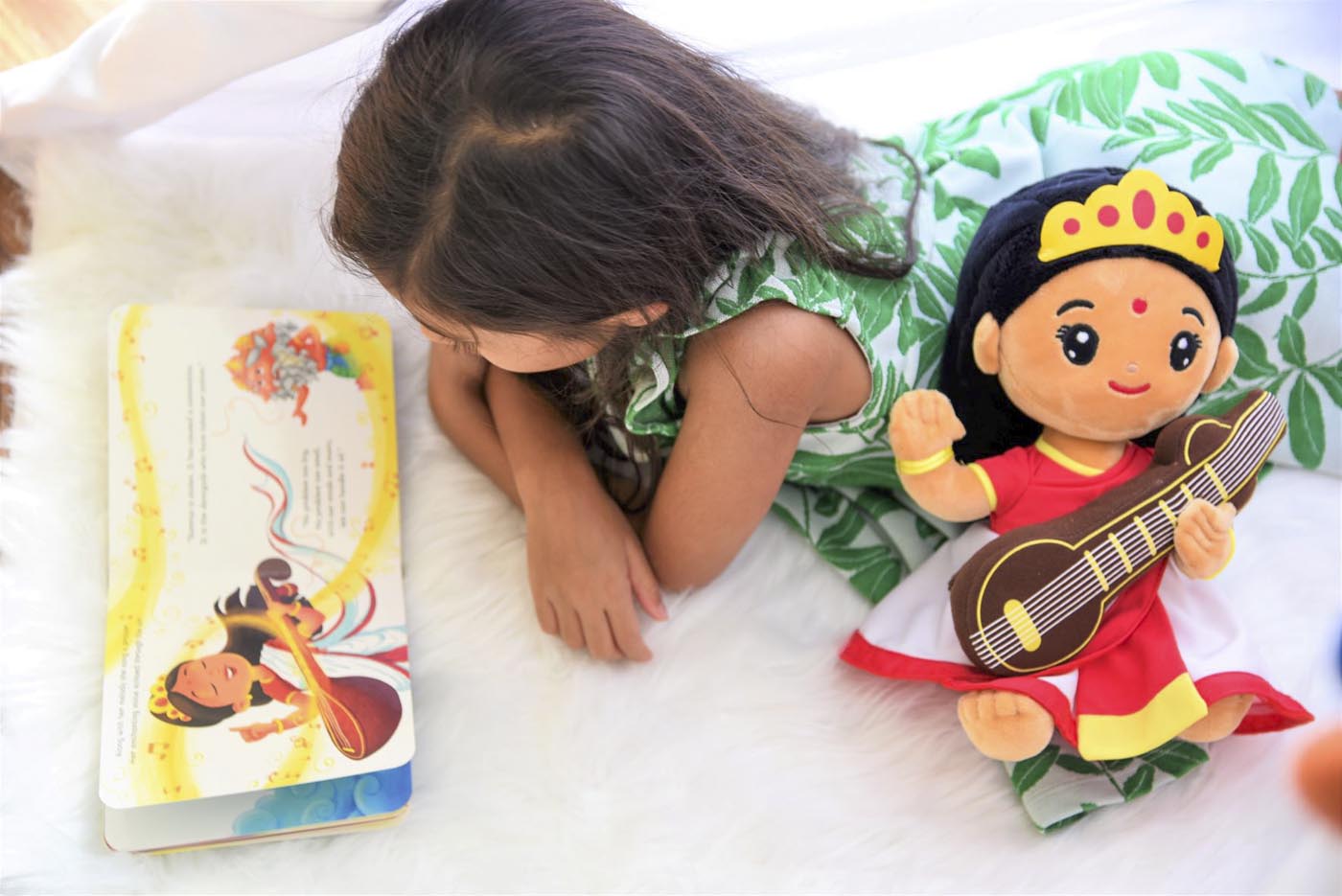A brother and sister’s creative journey from India to America and back again, resulting in a toy company to inspire young and old alike
By Lavina Melwani, New York City
When immigrant families leave India for foreign shores, they often can carry only what fits into a suitcase. Along with the photographs, the sacred texts and the masalas they bring to their new homes, they also bring a lifetime of memories and culture to gift to their children. But the children remember only a little, and forget even more as they acclimatize to a new country and a new world. Avani Sarkar nee Modi, who left Ahmedabad when she was eight, remembered little about Hindu culture and traditions besides the fact that her mother always used cooking as the language of love and cooked for all festivals.
Their family was fortunate: they landed in Somerset, New Jersey, which was already like a thriving Little India. For the Modis, who were a deeply religious family, home life and culture were not starkly different from the world just outside, thanks to the larger Indian community present. Both their new American life and their Indian culture could flourish. It was their immigrant parents who struggled more than the children, as they worked to establish their roots and create temples and cultural organizations.
“These uncles and aunties were the ones who got us involved in Indian dancing and music with a celebration of all our festivals,” recalls Avani. “I really credit New Jersey for allowing me to preserve so much of my cultural learnings. If I had gone grown up elsewhere, I think my upbringing would have looked a little different, because I probably would have had to try harder to assimilate into my surroundings. Here, I felt very safe to embrace the cultural identity that I think now we’re so proud that we had when I was growing up. Because of those things, I never felt like I was an outcast in society. I felt very much like I was in a place like home away from home.”
So, Avani and her older brother Viral, who was 14 when they arrived in the US, never forgot their cultural roots. But these became merged with their American life and were not always of prime importance—that is until they became parents themselves. It was then that they had the urge to create special cultural toys for the third generation growing up so far from India.
“There were two main factors behind the inspiration for Modi Toys for me and my brother, and one was absolutely the environment that we grew up in. Our parents are fairly religious people who pray every morning at the home shrine and then also go to the temple—my father has been going to the same temple every Monday for the past 35 years. It doesn’t matter if he’s been to another temple that day—he still must visit his temple! It’s just something that’s been so ingrained in him, and we grew up watching him. And you know, our generation retained just a small percentage of it, we understand that our faith is important, and we have to try our best in preserving it and passing it down to our kids.”
Passing on faith to children growing up in a different world is always a challenge, for there is the generational divide and so many competing influences. “Are we practicing it in the same manner that our parents did?” asks Avani. “Absolutely not. That’s just the nature of how things progress, how people age and how generations change.”
Avani and Viral became parents within weeks of each other. Avani recalls, “Suddenly we started asking ourselves questions I think only parents ask themselves. When you are an aunt or an uncle, you don’t think about these things, because you’re not the one in the driver’s seat. As parents, you’re now responsible for raising a child. And so now, instead of being children ourselves, we became the parents raising children and started asking ourselves these questions: ‘How are we going to raise our kids as first-generation Indian Americans when they are thousands of miles away from India and don’t have any connection to it? They have no memories of it. They’re not learning the language, because English has become a primary language at home. They’re not watching Doordarshan on TV every day, because now they have 50 million options to choose from, unlike us, where we only had one channel to watch together as a family.”
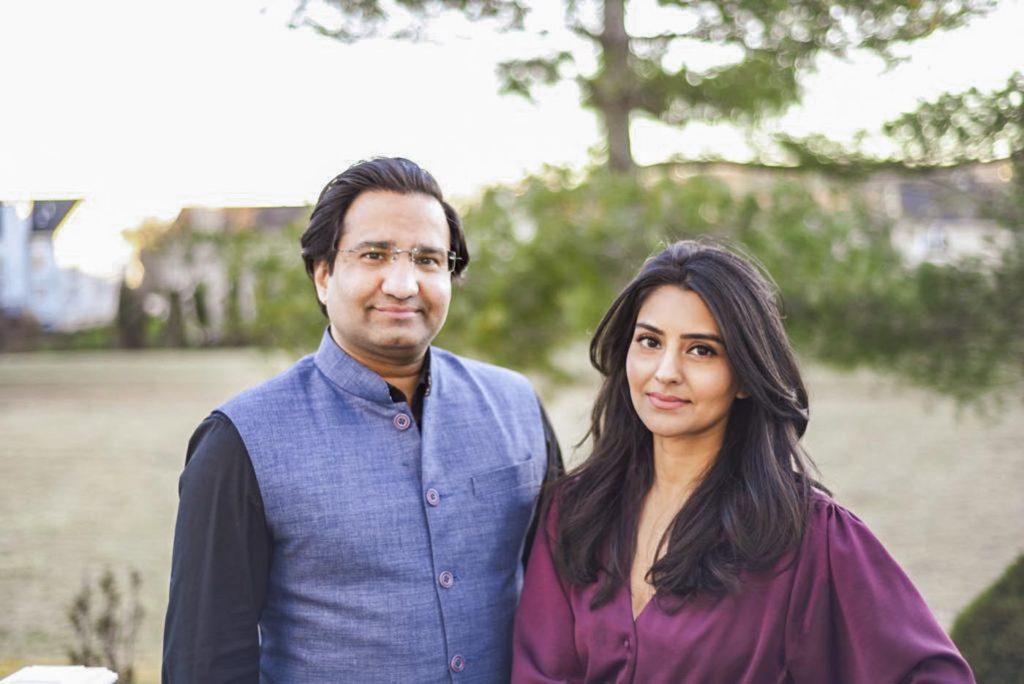

Even the food they are eating has changed from their mother’s daily Gujarati thali to whatever the younger generation can muster in their busy, time-pressed American lifestyle. “Our children are being raised in an environment that is so different from the way that we were raised, that we felt that the onus was really on us to find a starting point to give them our faith and our culture.”
It became all about invention and creation, especially when Viral and Avani realized there were no faith-based toys on the market. “When you think about how children learn, it’s through play,” says Avani. “They learn through play, not just when they’re newborns, but throughout their formative childhood years. And so that’s where we got the idea that if there’s a way to incorporate a culture of play, it doesn’t really feel like a tactic, but it’s just more like you’re playing and you’re having fun, and in the process you’re learning something meaningful.”
While Avani got engrossed in the complex world of being a new mother, her brother Viral kept at the concept of faith-based toys. About four months after they had discussed the idea, he had created a sketch of a prototype. Seven months later, he had a working prototype in hand, made by a local manufacturer in the US. Says Avani, “Viral took the seed of an idea and brought it to life, which was so unexpected, because these were just conversations, and they felt like nothing would come of it. He did it, and now it’s been five years since that conversation happened!”
In those five years, their start-up venture has jump-started to huge success, both to the cheers of consumers and critical acclaim from the media. Modi Toys has been featured in Bloomberg, Good Morning America, Entrepreneur, Parents and the Good Housekeeping Best Toys Award. The recognition on mainstream media outlets has been amazing, showing what an important need Modi Toys is filling in the Indian-American diaspora as well as the wider American life. Through popular media, you learn that celebrities Priyanka Chopra and Mindy Kaling have both bought these toys for their children.
Avani Sarkar herself has been been recognized in Forbes “Next 1000,” Inc “Female Founders 100,” Ernst & Young “Entrepreneur of the Year” NJ finalist, as a Tory Burch FoundationFellow and a Stevie Award Winner.
Toys That Chant Mantras
It seems there was a crying need for such toys for the Hindu third generation of children growing up in America—and Modi Toys has filled that demand. They have brought the Hindu Gods and Goddesses into the Tech Age with their collection of plush toys of the Deities, from Ganesha to Durga, Krishna and Saraswati. What’s unique about these toys is that when you squeeze their belly, they chant five different mantras respective to each Deity. Sacred mantras right from the crib!
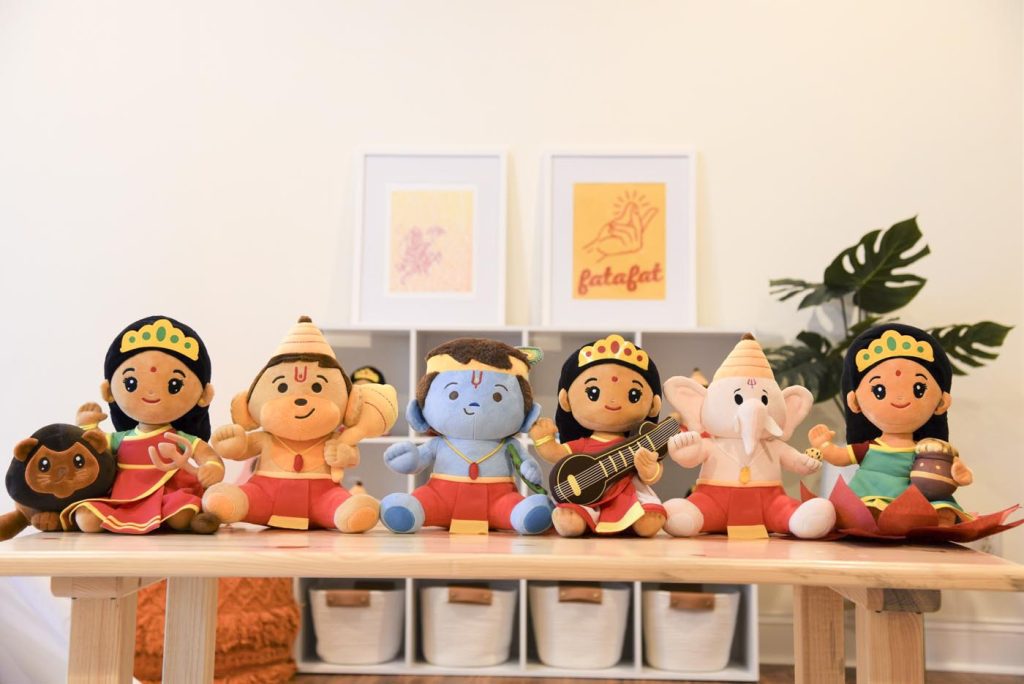

If you’re wondering how well babies and toddlers will absorb and repeat Sanskrit chants, you’re in for a surprise. It seems many children learn to chant the Gayatri Mantra and other slokas easily. Avani says she speaks from experience here. Before they first brought the product to life, their kids were between one to two years old, and they used them to test the toys. Now they have a two-year-old, three-year-old and a six-year-old, all of whom have used their toys since birth. Avani remarked, “I can attest and say that, yes, they do learn from a really young age. Because for them, it’s all sounds, words—they don’t make a distinction between what’s Sanskrit, what’s sacred, what’s English and what’s nursery rhymes.”
“So, you know, really the key is to make it fun and make it somewhat musical and repetitive. That’s how kids learn. So now I see my two-year-old, even before he was two years old, he could say bits and pieces of the Gayatri Mantra. And to me, both as a mom and the co-founder, it makes me very proud because this was a hypothesis, right? Ultimately if we can incorporate alternate education into play, there is a way to actually teach our children and in fact, it turns out they do learn. And we saw this firsthand as our kids were getting older and after hearing countless anecdotal feedback from our customers as well.”


Learning by Playing
Each plush toy subtly teaches the child about the Deity’s attributes. Durga Ma, for instance, features a trishul, or trident, in Her left hand, while offering blessings with Her right hand. Since Durga is never seen without Her trusted lion, it is included with Her. The Goddess’s attributes become playthings and yet a learning experience.
These Deity toys are also eco-friendly, which is so important to today’s consumers. With the purchase of each of the plush toys, consumers are saving up to 15 plastic bottles from toxic environmental waste. These bottles, which would have ended up in landfills, are now the stuffing in the belly of these beloved Hindu Deities. Modi toys are lab-tested and certified and have received a 4.5 rating from consumers in 35 countries. Each of these gifts can be personalized to the child it’s being gifted to.
Avani and Viral have also built in a concept of freshness and diverse products into the company—there are books, board games, animated videos and other offerings tapping into the faith-based culture of Hinduism. The Shhhanti Musical Crib Mobile features over an hour of continuous soothing instrumental hymns, mantras and aratis, and is Bluetooth enabled. A baby will be in bliss right from the start.
Modi Toys has also launched books geared towards families who want to celebrate diversity and culture in a less faith-based context. A recent offering is Desi Devis, an A-to-Z book highlighting 26 women from the South Asian culture from past and present. Explains Avani, “I wanted to spotlight women that maybe many people already know about, like kids may learn about Kamala Harris in school or Mindy Kaling through pop culture, but also people whose stories I feel are often forgotten, or even untold. So that book is special to me personally.”
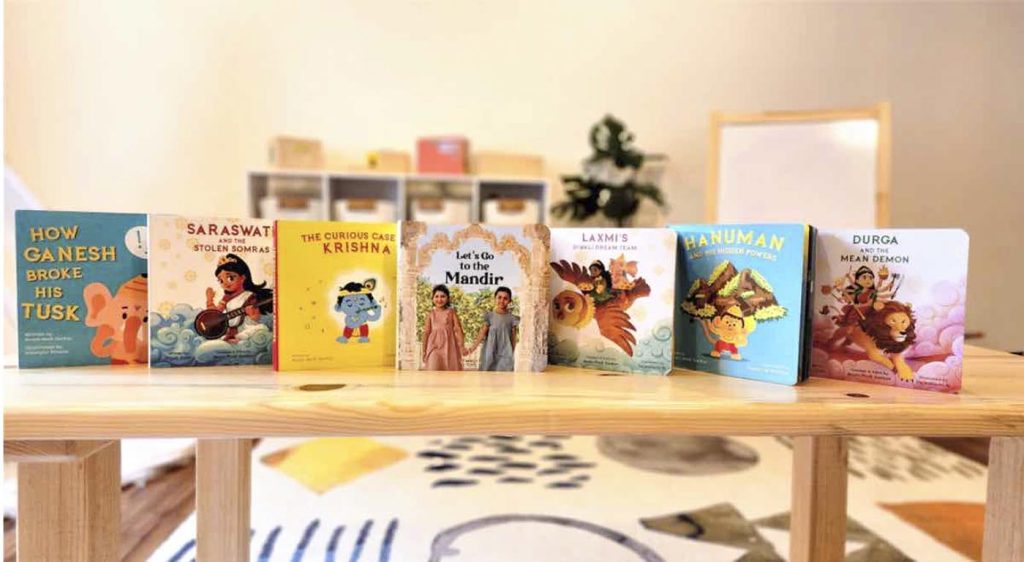

How can festivals be more fun and integrated into the American way of life? Many puzzles and games on the market are associated with Christmas and Thanksgiving, but few highlight Indian festivals like Diwali. Modi Toys has introduced an activity book called Rangoli, with stickers, to create 12 different Rangoli patterns—through puzzle pieces which children match to corresponding numbers. It results in delightful art by your child which you can frame on your fridge.
Avani and Viral have worked to make the company not one with just a “buy, buy mantra” but one which interacts with the consumer, with lots of free resources to help the consumers get more bang for their buck. There are scores of activities at moditoys.com under “resources,” to keep children involved and busy.
“As parents look for resources, we want to be at the forefront to provide these types of resources to families and make it easy for them so that they don’t have to think twice about activities and presentations,” says Avani. “We have a ‘Learning’ page on our site which is filled with tons of stuff including story animations. We actually took our books and turned them into animated videos the kids can watch on YouTube. Screen time obviously is a fact of life now, so instead of trying to fight it, we embrace it. All our workbooks are available for free on YouTube, and we also created a Diwali PowerPoint presentation that parents or teachers can show to kids. It is a great way to celebrate and teach Diwali in school, which is now becoming more widely recognized.”
For Holi, Modi Toys has organic color powder which is carried seasonally. They also have a charming Krishna online challenge where boys and girls are invited to dress as Krishna and upload their photos on the site. Friends and family vote online for the cutest Baby Krishna, and the winner receives a $ 100 gift card to the website.
“As you know, all festivals are rooted in Hinduism and have a backstory. So, we try to weave ourselves into these holidays in a fun way as opposed to a strict religious manner, because when it comes to faith it’s a broad spectrum,” points out Avani. “Some people really appreciate the fact that we’re trying to make it more accessible, while others may feel we’re not doing justice to how they believe it should be presented. But you know, to each their own—we’re not here to preach. We’re just here to make things accessible for people who would want to take advantage of what we offer.”


Avani agrees that while women are the agents of cultural change because of their roles as mothers and mentors, she believes men play a big role, too. “We end up becoming the face of these changes, but absolutely make no mistake that my brother is the CEO of the company. He’s the behind-the-scenes guy, but he’s the one that really brought this to life and kept the engine running on the backend. But we make a great tag team, because we both individually have a lot of strengths that complement each other.
“The most interesting chapter in our story now is that my brother moved to India with his family in an effort to really expand our business and to be closer to the suppliers’ chain as well,” says Avani. “So that’s a huge step, because our parents moved to America to search for a better life. And now my brother has gone back for the very same reason. So, life is really coming full circle, and it’s great. Also, the fact that we will be giving jobs to people over there is a very good thing.”
It seems appropriate that these toys about India’s religious heritage are actually made in India and the company has offices both in India and in Edison, New Jersey. Asked about expansion plans, Avani says, “So our primary market is the US, but we’re trying to grow the market, and India was, as you can imagine, very difficult, because it has a population of a billion people. It’s like trying to make—not a drop in the bucket—but a drop in the ocean!”
She adds, “I feel like we’re not competing as much with other products but just competing for people’s attention. Because now we already have a number of robust copycats in India, who are trying to feed at the bottom of the barrel, they’re just trying to compete on price and quality. They don’t have the same sort of founder story that we do, there are no emotional elements involved and they are just trying to cash in on this.”
For Modi Toys, their unique selling proposition is their connection to the community and the strength of their offerings. And the toys are in people’s lives with a wide range of social media posts, whether it’s children dressed up as Baby Krishna or a grandma praying with the Baby Hanuman who chants the Hanuman Chalisa by her side. “You will see stories that inspire you, stories that entertain you so that you just feel something at the end of the day, and I feel like that is a quality that’s hard for a brand to try to replicate,” says Avani Sarkar. “And that’s why I feel like nobody else, no other brand really comes close to what we have achieved and what we’re doing, because none of them come from a place of genuine caring, of desire to make a difference.”
Gifts for Life
Perhaps the larger reason for the success story of Modi Toys is the toys themselves: they are more than mere toys. Avani recalls a woman whose pregnant daughter-in-law was involved in a car accident and was being rushed to hospital. The woman reached out to have the Baby Ganesha shipped overnight to her. Says Avani, “We felt really bad about what had happened; but the fact that she reached out to us and in time of such difficulty, it made us realize right there and then that this is way bigger than a toy brand. You know, you look differently at a toy like this. You don’t go to a Disney store and think, ‘Oh my God, I need to pick up this toy because someone I love closely was just injured.’ These toys, besides being given to newborn babies as a gift and blessing, are also a gift to a sick grandmother to find comfort, for someone who’s had a stillborn, or is going through IVF or has just beat cancer.”
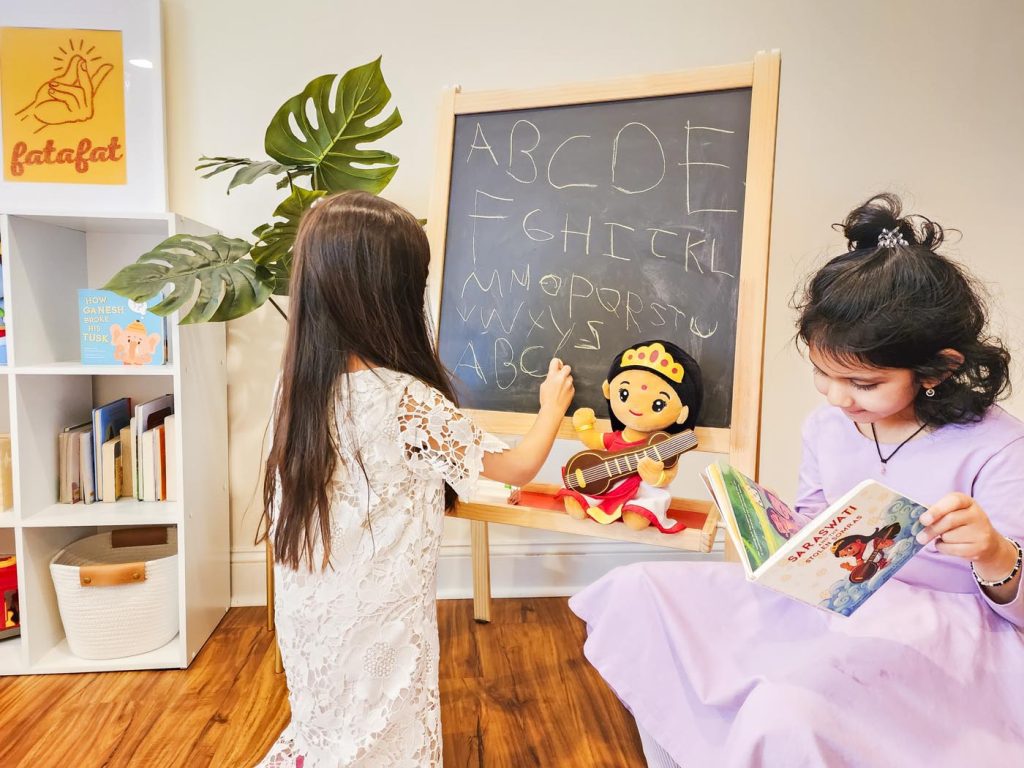

Indeed, each Hindu God and Goddess symbolizes some strength, some quality which we all try to emulate: Durga is the Goddess of power and protection; Hanuman denotes strength and devotion; Krishna is all about love and loyalty; Saraswati about education and the arts and is the perfect blessing for graduation, back to school, recital or any occasion that celebrates creativity. Ganesh—the beloved God of new beginnings and new ventures—becomes the emblem of good luck for any endeavor, big or small.
“We have people thinking of us during good times and bad, which tells us what we stand for. What we manufacture may be toys, but what people buy from us is a symbol of hope and joy, and I think that is always going to be our legacy. Because of what they symbolize, our toys have really taken on a life of their own. They are no longer viewed as a toy for a child but as a symbol of whatever it is that you know it represents that can be gifted to anyone of any age, based on what it is that they’re either celebrating or experiencing in life at that time.”


